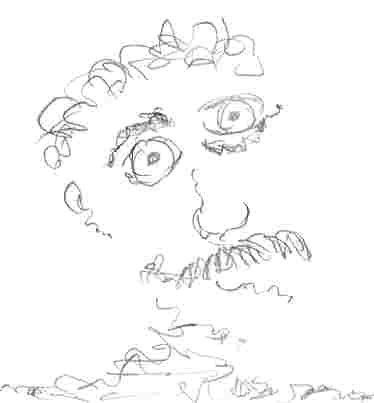Finnegans Wake
by James Joyce
The Viking Press (1939)
Penguin Books (1999)
It might or might not be significant that I finished reading this book early in the morning on the eleventh anniversary of my father�s death. I feel it is, but I have always been impressed by such coincidences. There is nothing in the book that ties the events together, or suggests a relationship, except that everything in the book seems tied to everything else � including the present moment and the words on this page.
Finnegans Wake is a dream � to read, to live, and from which I hope never to awaken. It is not a book in any usual sense. It has no plot. It begins nowhere, ends nowhere, and only occasionally makes sense, and the sense it makes is fleeting, transitory, and dependent on one�s background, experience, attention, and mood. It is a rich linguistic feast. Joyce draws upon more than sixty languages. He changes words. He alters their spelling. He twists them, tricks them, surprises them, gives them new meaning. He uses them not just to form sentences, but to create movement, images, colors, and sounds. Every page is rich with humor. And sorrow. Loneliness. Disgust. Vision. Strength. Hope. Inspiration. In fact, if I had taken the time to write down even a small portion of the thoughts and ideas I had while I was reading, or the revelations I experienced (however humble), I never would have finished reading. As it is, the project took me six months � partly because I also read a few other things during that time, but mostly because I promised myself at the beginning that I would take my time and try to carefully pronounce each and every
word � for a casual glance at Finnegans Wake is enough to convince most readers that it is gibberish, or, at best, an obscure text to be analyzed by scholars and discussed in a stuffy setting.
Having first read Ulysses, though, I knew an artist of Joyce�s immense gifts would not spend seventeen years slaving over a text with his failing eyesight just to produce academic fodder or a grand literary riddle. His was a quest to go beyond, to seek out the depths of language and know its original source:
riverrun, past Eve and Adam�s, from swerve of shore to bend of bay, brings us by a commodius vicus of recirculation back to Howth Castle and Environs. . . .
And so the text begins, at an unknown point in a journey long since begun, and as meaningful and elusive as the mist.
When you read Finnegans Wake, make no demands. Do not resist. Allow yourself to enter Joyce�s poetic dream. Listen. If you are too tired or distracted, wait awhile. The book deserves your best, undivided attention. And I strongly recommend that you read it aloud. I did � all 628 pages, and I enjoyed every minute.
Speaking of reading, I�d like to direct your attention to a website that features a recording of James Joyce reading a small portion of Finnegans Wake, along with the corresponding text. Listen to it a time or two. You�ll be amazed, and then, later, as you continue with your own reading, the text will seem even more alive. I had already been reading awhile when I discovered the recording. I�ve been hearing Joyce�s voice in my head ever since. Granted, that might indicate another problem, but that�s no reason you should deny yourself the pleasure of listening to the author�s marvelous voice, accent, and delivery.
I really do feel that Finnegans Wake is one of the greatest books ever written. It is a triumph on the order of Beethoven�s Ninth Symphony, and just as musical in its own right � a work for the ages open to countless interpretations. The text is alive.
Back to Favorite Books & Authors

Also by William Michaelian
POETRY
Winter Poems
ISBN: 978-0-9796599-0-4
52 pages. Paper.
����������
Another Song I Know
ISBN: 978-0-9796599-1-1
80 pages. Paper.
����������
Cosmopsis Books
San Francisco
Signed copies available
Main Page
Author�s Note
Background
Notebook
A Listening Thing
Among the Living
No Time to Cut My Hair
One Hand Clapping
Songs and Letters
Collected Poems
Early Short Stories
Armenian Translations
Cosmopsis Print Editions
Interviews
News and Reviews
Highly Recommended
Let�s Eat
Favorite Books & Authors
Useless Information
Conversation
Flippantly Answered Questions
E-mail & Parting Thoughts
More Books, Poetry, Notes & Marginalia:
Recently Banned Literature
A few words about my favorite dictionary . . .
From Finnegans Wake
by James Joyce
. . . They near the base of the chill stair, that large incorporate licensed vintner, such as he is, from former times, nine hosts in himself, in his hydrocomic establishment and his ambling limfy peepingpartner, the slave of the ring that worries the hand that sways the lamp that shadows the walk that bends to his bane the busynext man that came on the cop with the fenian�s bark that pickled his widow that primed the pope that passed it round on the volunteers� plate till it croppied the ears of Purses Relle that kneed O�Connell up out of his doss that shouldered Burke that butted O�Hara that woke the busker that grattaned his crowd that bucked the jiggers to rhyme the rann that flooded the routes in Eryan�s isles from Malin to Clear and Carnsore Point to Slynagollow and cleaned the pockets and ransomed the ribs of all the listeners, leud
and lay, that bought the ballad that Hosty made. . . .
. . . If juness she saved! Ah ho! And if yulone be pouved! The olold stoliolum! From quiqui quinet to michemiche chelet and a jambebatiste to a brulobrulo! It is toild in sounds in utter that, in signs so adds to, in universal, in polyguttural, in each auxiliary neutral idiom, sordomutics, florilingua, sheltafocal, flayflutter, a con�s cubane, a pro�s tutute, strassarab, ereperse and anythongue athall. . . .